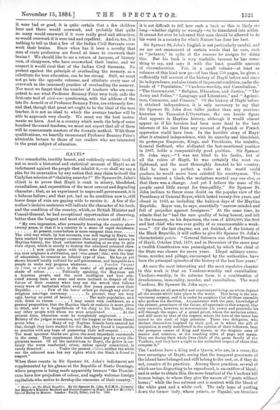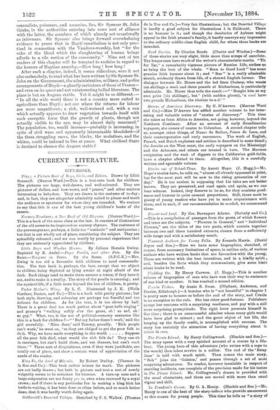HAYTI.*
'Tins remarkable, terribly honest, and ruthlessly realistic book is not so much a historical and statistical account of Hayti as an indictment against the people that inhabit it,—or shall we say a plea for its annexation by any nation that may claim to itself the Carlylian mission of "chaining anarchy?" Sir Spenser St. John's object is to prove that Hayti is sunk in misery, bloodshed, cannibalism, and superstition of the most sensual and degrading character ; that, as an experiment in negro self-government, it is a hideous failure; and that yet, bad as its condition now is, still lower deeps of ruin are gaping wide to receive it. A few of the author's incisive sentences will indicate the character of his book, and the condition of the country, which, as British Minister and Consul-General, he had exceptional opportunities of observing, better than the longest and most elaborate review could do :— "My own impression, after personally knowing the country above twenty years, is that it is a country in a state of rapid decadence.
At present, cannibalism is more rampant than ever The civil war which, by last accounts, was still raging in Hayti, has been marked by more savage excesses than any previously known in Haytian history, the black authorities hesitating at no step to gain their object, which is utterly to destroy the educated coloured class.
I now quite agree with those who deny that the negro nan ever originate a civilisation, and [who assert] that, with the best of educations, he remains an inferior type of man. He has as yet shown himself totally unfitted for self-government, and incapable as a people to make any progress whatever Prendre Pargent de ce West pas voler, is the motto of all parties of every
shade of colour Politically speaking, the Haytians are a hopeless people, and the most intelligent and best edu- cated among them are more and more inclined to despair of the future of their country when they see the wreck that follows every wave of barbarism which every few years passes over their
Republic Few of the lower orders go through any civil or religious marriage ceremony In general, they are very ugly, having no point of beauty The male population, as a rule, drink to excess I may assert with confidence, as a general proposition, that the Haytian black or mulatto is more given to drink, and to a forgetfulness of his duty to his family, than any other people with whom we were acquainted At the present time, education must be completely neglected. . . . .
Bribery of the judges is notorious, and the longest or the most liberal purse wins Many of my Haytian friends have assured me that, though they have studied for the Bar, they found it impossible
to practise with any hope of preserving their self-respect The most ignorant blacks are given the most important commands in the army. They supplement their inadequate pay by every ille- gitimate means. Of all the institutions in Hayti, the police is cer- tainly the worst conducted ; crime, unless openly committed, is
rarely detected Under the present rtfgime, neither the white nor the coloured man has any rights which the black is found to respect."
When these counts in Sir Spenser St. John's indictment are supplemented by his glance at the Republic of Santo Domingo, where progress is being made apparently because "the Domini- cans have few prejudices of colour, and eagerly welcome foreign capitalists who arrive to develop the resources of their country,"
* Hayti ; or, the Black Republic. By Sir Spenser St. John, K.O.M.G., formerly her Majesty's Minister Resident and Consnlneral in Hayti, now her Majesty's Special Envoy to Mexico. London : Smith, Elder, and Co. 1584.
it is not difficult to tell how such a book as this is likely ere long—whether rightly or wrongly—to be translated into action. It cannot for ever be tolerated that man should be allowed to do his worst in a country for which Nature has done her best.
Sir Spenser St. John's English is not particularly careful, and we are not enamoured of certain words that he uses, such as " jactance," in spite of the reasons he issigns for doing this. But his book is very readable, because he has some- thing to say, and says it with the least possible amount of circumlocution. For, in a small volume—at least as volumes of this kind now go—of less than 3:50 pages, he gives a sufficiently full account of the history of Hayti before and since its independence, and also treats of its present condition, under the heads of "Population," "Vaudoux-worship, and Cannibalism," "The Government," "Religion, Education, and Justice," "The Army and Police," "Language and Literature," and "Agricul- ture, Commerce, and Finance." Of the history of Hayti before it attained independence, it is only necessary to say that Sir Spenser St. John does fuller justice than any previous historian to Toussaint-L'Ouverture, the one heroic figure that appears in Haytian history, although it would almost appear as if his heroism had been more fatal to the best interests of his race than any amount of Spanish or French oppression could have been. In the horrible story of Hayti after it attained independence, with its anarchy and bloodshed, its grotesque Emperors, Kings, and Presidents, the mulatto, General Geffrard, who abdicated the last-mentioned position in 1867, holds a comparatively good position. Sir Spenser
St. John says,—" I was not blind to his faults, but of all the rulers of Hayti, he was certainly the most en- lightened, and the most thoroughly devoted to his country. Had he been as perfect a ruler as the world could produce, he would never have satisfied his countrymen. The blacks wanted a black, the mulattoes wanted any one else, so that there was a change. And yet I believe the mass of the people cared little except for tranquillity." Sir Spenser St. John inclines to throw some doubt on the popular view of the Presidency of General Boyer, which lasted twenty-five years, and closed in 1843, as including the halcyon days of the Haytian Republic. Boyer was, he says, essentially "narrow-minded and full of prejudice against foreigners." At the same time, he admits that he "had the rare quality of being honest, and left in the treasury, on his departure, the sum of £200,000, the first and last chief who was ever guilty of so unaccountable a weak- ness." Of the last chapter, not yet finished, of the history of the Black Republic, it will suffice to give Sir Spenser St. John's characteristic précis. "General Salomon was elected President of Hayti, October 23rd, 1879, and in December of the same year a twelfth Constitution was promulgated, by which the chief of the State was chosen for seven years. Illegal military execu- tions, murder, and pillage, encouraged by the authorities, have been the principal episodes of the history of the last four years."
At once the most interesting and the most repulsive chapter in this work is that on Vaudoux-worship and cannibalism. Vaudoux-worship, in its extreme form, is a combination of drunkenness, immorality, murder, and cannibalism. The word Vaudoux, Sir Spenser St. John says,—
" Signifies an all-powerful and supernatural being, on whom depend all the events which take place in the world. This being is the non. venomous serpent, and it is under its auspices that all those assemble who profess the doctrine. Acquaintance with the past, knowledge of the present, prescience of the future, all appertain to this serpent, that only consents, however, to communicate his power and prescribe his will through the organ of a grand priest, whom the sectaries select, and still more by that of the negress, whom the love of the latter has raised to the rank of high priestess. These two delegates, who declare themselves inspired by their god, or in whom the gift of inspiration is really manifested in the opinion of their followers, bear the pompous names of King and Queen, or the despotic ones of master and mistress, or the touching titles of papa and mama. They are during their whole lives chiefs of the great family of the Vaudoux, and they have a right to the unlimited respect of those that compose it."
The Vaudoux have a King and a Queen, who are, in a sense, the true sovereigns of Hayti, seeing that the temporal governors of the island have belonged and still belong to the sect, or, if they do not, connive at its practices. Among these practices, several of which are too disgusting to be reproduced, is an outflow of blood; and in order to obtain this, the more fanatical of the Vaudoux kill human beings, to whom they give the names of "goats without horns ;" while the less extreme sect is content with the blood of the white goat and a white cock. The only hope of putting down the former body, whose priests, or Papaloi, are ferocious sensualists, poisoners, and assassins, lies, Sir Spenser St. John thinks, in the authorities entering into some sort of alliance with the latter, the members of which already act occasionally as informers. Sir Spenser also brings forward overwhelming evidence to prove that in Hayti cannibalism is not only prac- tised in connection with the Vandonx-worship, but "for the sake of the blood which the slaughtering of human beings affords to a vile section of the community." Nine out of ten readers of this chapter will be tempted to exclaim in regard to the horrors of Haytian anarchy,—How long ! how long !
After such a chapter, indeed, it seems ridiculous, were it not also melancholy, to read what has been written by Sir Spenser St. John on the Government, the administrative, military, and police arrangements of Hayti—a ghastly caricature of those of France— and even on its queer and not uninteresting ballad literature. The place is but an Augean stable. Yet it might be so different :— "In all the wide world there is not a country more suited to agriculture than Hayti ; not one where the returns for labour are more magnificent ; a rich, well-watered soil, with a sun which actually appears to draw vegetation towards itself with such energetic force that the growth of plants, though not actually visible to the eye, may be almost daily measured." The population, too, would increase—probably is increasing, in spite of civil wars and apparently interminable bloodshed—if the three struggling races, the blacks, the mulattoes, and the whites, could be induced to live at peace. What civilised State is destined to cleanse the Augean stable ?



































 Previous page
Previous page